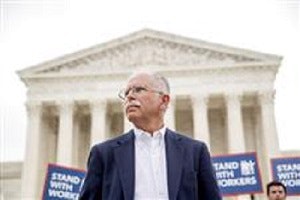The U.S. Supreme Court’s ruling Wednesday against a mandatory labor union fee for nonmember public-sector employees was met with immediate criticism, some from observers in higher education who anticipate a negative impact on unions at state-funded universities.
 Plaintiff Mark Janus
Plaintiff Mark JanusIn a 5-4 decision widely criticized as a setback to organized labor, the high court determined that forcing nonconsenting workers to pay “fair share” agency fees to public-sector unions that negotiate with the government – even to help cover expenses related to collective-bargaining matters – violates those workers’ First Amendment rights by forcing them to support political actions that may go against their person beliefs. The ruling was in the case Janus v. American Federation of State, County, and Municipal Employees Council 31 and other defendants.
“Although this decision was not unexpected, we are disappointed by the opinion of the majority,” said Dr. Rudy Fichtenbaum, president of the American Association of University Professors.
“Those AAUP chapters that have been formally recognized as unions negotiate legally enforceable contracts that incorporate AAUP principles. This ruling makes their job more difficult. …On the surface, this case may seem like a technical one that doesn’t affect many faculty,” said Fichtenbaum. “But Janus and similar court cases and legislative initiatives are part of a broad assault on public institutions and the common good. They seek to roll back protections for working people, lessen public support for civic building blocks such as education, and diminish the ability of unions to have a positive impact.”
The plaintiff in the case, Illinois state government employee and non-union member Mark Janus, challenged the constitutionality of the fee, arguing in part that it violated his First Amendment right of freedom of association because he was forced to help fund actions the union may support but that he may not. The ruling directly affects approximately two dozen states where public-sector unions currently impose such fees.
 Dr. Ian Robinson
Dr. Ian RobinsonWriting the opinion for the court’s majority, Justice Samuel Alito said: “We recognize that the loss of payments from nonmembers may cause unions to experience unpleasant transition costs in the short term, and may require unions to make adjustments in order to attract and retain members. But we must weigh these disadvantages against the considerable windfall that unions have received under Abood for the last 41 years. It is hard to estimate how many billions of dollars have been taken from nonmembers and transferred to public-sector unions in violation of the First Amendment. Those unconstitutional exactions cannot be allowed to continue indefinitely.”
Abood was a landmark case in 1977 in which the Supreme Court unanimously ruled against the Detroit Board of Education, upholding the right of employees in a public workplace to have a union and affirming the ability of unions to require agency fees – for nonpolitical purposes – of all workers covered through their collective bargaining.
The National Action Network, a civil rights organization whose base includes affected union members, issued a statement calling the Janus decision “an existential blow to public-sector employees and the unions that fight for them.”
“Fair-share fees have never been about political activity,” said NAN president and civil rights leader Rev. Al Sharpton. “They’re about making sure workers – all workers – have the most effective and competent counsel possible when it comes to ensuring living wages. Instead, today, workers of all stripes have been once again beaten down by the highest court in the land in favor of billionaires and corporations. We at National Action Network stand against these mind-bogglingly short-sighted efforts to hollow out real people’s right to fight for a living wage. The court is on the wrong side of history.”
The ruling appears to be part of a pattern of “systematically closing down ways that working people can influence and fight back against corporate power,” said Dr. Ian Robinson, a lecturer at the University of Michigan and president of the Lecturers’ Employee Organization, a local unit of the American Federation of Teachers that represents upwards of 1,700 lecturers across three Michigan campuses.
Still, Robinson said, the impact on that particular union may be negligible. He doesn’t expect membership numbers to dip significantly. He said the impact on revenue will become clear by mid-fall, but added that any losses may be offset and more than made up by increased revenue resulting from higher wages for members negotiated in the most recent round of collective bargaining.
Robinson, who also is president of the Huron Valley Area Labor Federation of the AFL-CIO, said many public-sector union leaders have been expecting and preparing for the kind of legal opinion handed down Wednesday.
“There’s a lot of hand-wringing about it that is probably exaggerated,” he said. “I think strong unions whose members feel like they have a strong voice in it will make gains. Most probably will lose some revenue, but not necessarily a lot of members. The impact can be negative but not disastrous. The more important thing for the labor movement is, what’s your spirit? What do people believe? What are they willing to fight for?”
Staff Writer Sarah Wood contributed to this report.





















